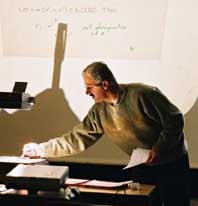
See Focus (Haifa University, Autumn 2003) for the original version
Israel's First Druze Math Lecturer
Feels at Home Here

"My grandfather was a human calculator; he
could do all kinds of calculations in his head. My father only went
to the fourth grade, but he could do four-figure multiplication in
his head. I guess I inherited their genes."
Toufik Mansour,
35, was
explaining how he became the first member of the Druze community in
Israel to become a university lecturer in mathematics. "I have loved
math since the age of 0," continued the University of Haifa’s newest
math teacher and researcher. His parents were more concerned that
he wasn’t studying to become a doctor, as their community at the
time considered a physician to be the top professional.
The University played a defining role in the young Mansour’s choice of career direction. His economic situation had forced him to drop out of the Master’s program at the Technion, where he had earned his Bachelor’s in Math. After three years of working as a teacher in different schools, from elementary to high school, he returned to his higher education, but now transferred to the University.
The University of Haifa, he acknowledged, opened doors for him. But perhaps even more important was that “I felt at home here,” as he expressed it. “I was well treated, both mathematically and economically.”
Mansour had actually written his Master’s thesis during his three-year working interval, and the Math Department here, impressed with the work, accepted it and then admitted him into its doctoral program. He finished his dissertation, with the suggestive title of “Permutations with Forbidden Patterns,” in three years. The budding mathematician had obtained initial results within six months and sent off a paper to a conference in Moscow. It was to be the first of a string of conference appearances and published works.
In fact, the American Mathematical Society’s Internet site, “Math SciNet,” which lists mathematicians around the world and their publications, shows that Toufik Mansour has now authored or co-authored twenty articles. Quite an impressive record, considering that he received his doctorate only two years ago.
Talking about his doctorate, he interjects a world of praise for his dissertation advisor, Prof. Alek Vainshtein. “I really have to thank my advisor,” he says. “His knowledge, his enthusiasm, and especially for being ready to help me at a moment’s notice with professional advice. He made me feel very strong during my work on the doctorate.”
Armed with a Bourse Chateaubriand, one of the French government’s most prestigious academic grants, Mansour went to Bordeaux to do a post-doctorate, but the experience proved disappointing. There weren’t the numbers doing research in his particular branch of discrete mathematics as he had been led to believe; but worse, except for a professor who became his supporter, French mathematicians remained aloof, not interested in his field.
Using the Internet as a math-dating service, he looked for research partners, and he proceeded to write more papers without even meeting his co-authors in person. “In the past year, though, I have met four of the people I wrote with,” he noted in passing. Thanks more to the Internet, he remarked, his year in France became one of his most successful. Still, he acknowledged Bordeaux University’s support of his post-doctoral research and several French mathematicians who did make him feel welcome during his stay.
Mansour next garnered a European Community Research Training Network grant, the only one from the University of Haifa to do so, and spent the next year in Gothenburg, Sweden. The Swedes appreciated him and his research and sought him out from the first day that his supporter at Chalmers University of Technology in Gothenburg recommended him. Ever gracious, he expressed himself grateful for the friendship of these Swedish colleagues and mentors, who also helped to make his and his family’s life easier there.
The objective of his two years of post-doctoral research, Mansour said, was “to get to know [others in his field], to strengthen [his ability in his particular field], and to learn [both more about his field and about other math areas].” He summed up his experience like this: “I managed this last [objective] more than I expected.
The Druze mathematician now found himself at a crossroads. Sweden, it was made clear to him, was out. So, should he return to Israel or accept a position in the United States? His wife Ronit, who had been left alone with their two young daughters, one an infant, in Israel for the first half of his stay in Sweden, pushed for a return. Finally during the summer, the University’s Math Department made him a three-year offer, financed by a prestigious Maof grant from the Council for Higher Education.
As a young married doctoral student, he also taught at four different colleges to finance the construction of his new home, as well as to have an income. Recalling his years as a doctoral candidate, Mansour commiserated, “She [his wife] pampered me so that I could complete my doctorate, but she also suffered with me.” Apparently the pampering paid off, and the University of Haifa seems to be a beneficiary.